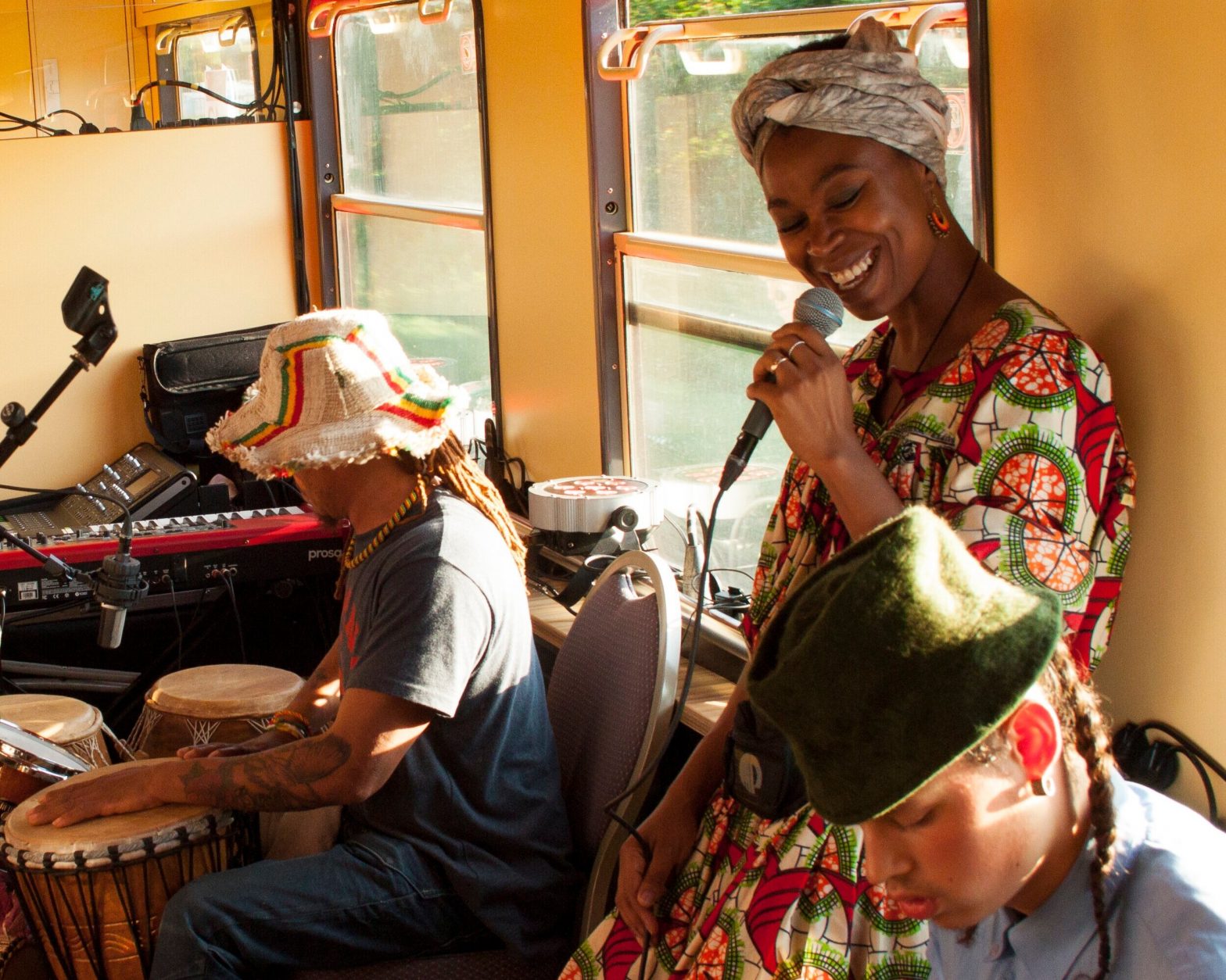Deep in the Dutch countryside, the vintage train trundles past windmill-dotted hay fields and canals stacked with state-of-the-art houseboats. Cyclists stop to watch as the burgundy carriages roll between level crossings, slow enough for the lilting sound of a saxophone solo to lazily drift through the open windows and into the late-June breeze. On board, the Ntjam Rosie Quartet croons out soulful RnB, while a packed-together audience sips on two-euro beers and sways to the rhythm of steel tyres and bongos, languid in the golden-hour heat.
Having departed Rotterdam at sunset, the first Jazz Night Express is in full swing. Travelling overnight to Berlin via Amsterdam, it hosts an eclectic lineup of jazz acts to play back-to-back en route. Engineer and rail travel enthusiast Chris Engelsman is the idea, which took two years to plan and incorporates sleeper cars, two live music carriages, an area for book readings and talks, and a restaurant. Hiring out a rickety, 1980s train to reinvent the magic of old-school travel, Engelsman calls it a ‘jazz festival with a night train message’. In partnership with Rotterdam-based jazz festival North Sea Round Town, the Express links the Dutch music capital with one of the world’s hottest jazz cities.
“The rhythm of jazz and the train goes well together,” explains Engelsman. “I’ve always loved night trains. When I was growing up, every day the Nord Express would pass my house on its way to St Petersburg. But the last night train in Holland was cancelled by 2016 because the railways were focusing on high-speed trains. It was such a pity, because there’s still a demand for them.”
If anything, that demand is increasing. Summer 2019 has been characterised by both sweltering heatwaves (one of which we’re in the midst of on the Jazz Night Express, which arrives in Berlin to the tune of 38 degrees Celcius) and flygskam, a Swedish movement meaning ‘flight shame’ that has translations in German, Dutch and Finnish. Europeans are considering the impact of their holidays on the environment – a train from London to Edinburgh produces 87% fewer CO2 emissions than a flight – and rail travel is skyrocketing as a result.
While the majority are Dutch and German, there’s a great deal of Swedish passengers on the Jazz Night Express, as well as a handful from the UK, Belgium, Portugal and Italy. In a surprisingly age-diverse mix, gaggles of friends lounge on retro-blue banquettes beside older couples and young families. With the windows down and the farmland-scented air rushing through carriages swaying to brass and percussion, our 12-hour trundle to Berlin feels like the epitome of slow travel.
Night creeps in over a Great American Songbook set by the Thijs Nissen Trio and I make my way to the retro dining car, all bright-blue curtains and varnished tables. It’s three courses for 59 euros – including wine that’s topped up whenever your back is turned – and surprisingly gourmet. The first course, under the name ‘Miles Davis’ on the menu, is a sharing platter of steak tartare, chipotle chicken and smoked salmon; the ‘New Orleans’ main course is beef bavette or asparagus and polenta tart; and the ‘Saxophone’ dessert is a pineapple pannacotta impaled by a shard of tempered dark chocolate.
The one-hour dinner slots have drastically run over. By the end of the final serving, it’s gone midnight – and the music is due to come to a close at half past. But all scheduling is thrown out the window in the party carriage, where DJ Maestro (founder of online radio station Jazz De Ville) is spinning funk, house and soul. Perhaps unsurprisingly, considering the train’s stop-off cities, this crowd is here to party. Reserves of cheap beer are starting to run low as we move onto gin and tonics, dancing ever-more wildly as the train gathers speed into the early hours of the morning. Disco ball spinning, the dance floor lurches from side to side as we meander through northern Germany. We briefly pull in at Bad Bentheim and Hanover, and passengers spill onto the platform to smoke cigarettes and swing each other around in the balmy night air, before the doors slam shut and we hop aboard to visit the bar again.
When the train creaks to a halt at Berlin Zoo, at 7.30am on the dot, I’ve had three hours sleep. We drag our bags off the train and blink blearily at the bustling station. New-found friends exchange hugs and contact details as the train staff and musicians prepare for a sleepier train ride back to Rotterdam.
“We have several ideas for the future, in addition to another Jazz Night Express in July 2020,” grins Engelsman, elated from the night’s success. “We’re considering a Jazz Night Train to Copenhagen, an Oktoberfest edition to Munich, a party train to Eurovision in The Netherlands.” While the passengers are enthralled by the night train’s romanticism, the musicians loved it too – “it was up close and personal, like playing a living room set,” singer Ntjam Rosie tells me – and the first edition even caught the eye of the Dutch national rail network, who hosted an on-board talk on the future of the night train. Meanwhile, Austria’s ÖBB and the Swedish government have both announced plans to invest in night trains. Perhaps the golden years of Europe’s night trains aren’t behind us after all – and you can count on Engelsman to be at the forefront of the new movement.
The next edition of Jazz Night Express runs on 3 July from Rotterdam to Berlin. Tickets cost 159 euros one way and 189 euros return. http://jazznightexpress.nl
